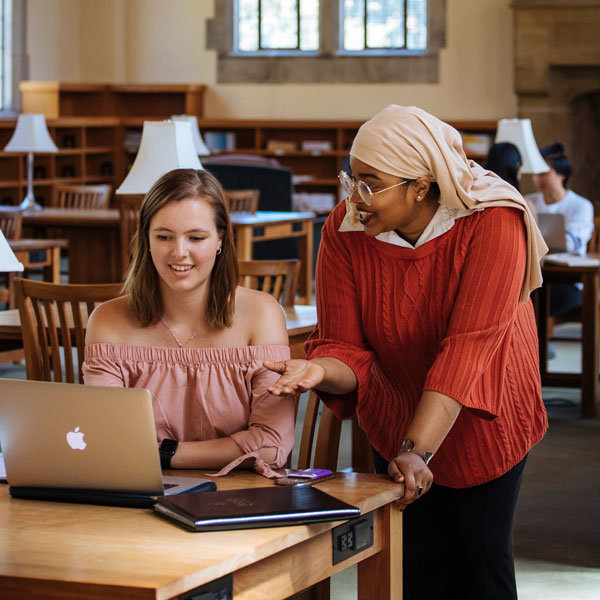There should be no barriers to your future.
We believe that you should have the opportunity to excel at Agnes Scott—regardless of your financial circumstances. Through a variety of merit- and need-based financial aid, we are committed to making our innovative education accessible and affordable to qualified students.
The Office of Financial Aid, together with the Office of Admission, is here to help new and returning students navigate the financial aid process. We know the process can be stressful for students and their families to work through, so we are here to support you along the way. This website is designed to give you insight and resources to understand the process.
AFFORDABILITY AT AGNES SCOTT FINANCIAL AID resources
Your Financial Aid Offer
The Office of Financial Aid administers all of Agnes Scott’s scholarships, grants, loans and federal work study aimed at helping students and families make Agnes Scott a possibility. Agnes Scott is consistently rated a “Best Value School” by U.S. News & World Report for this reason.
The first piece of the financial aid offer are Agnes Scott Scholarships. For most of our scholarships, students must simply apply to the college. Applicants who submit their complete Common Application and all supporting materials by the Early Action II deadline (January 15) are automatically considered for merit-based scholarships ranging from $26,000-$32,000 a year. These scholarships are awarded based on factors including academic achievement, community service, leadership and extracurricular involvement. For example, check out our AGNES SCOTT $100K+ PROMISE.
We do have a small handful of application-based scholarships. Review those and apply below:
This scholarship is awarded to incoming first-year students who are promising music students, and who demonstrate scholastic ability, talent and seriousness of thought, purpose and endeavor. Students who have financial need will be given priority.
The scholarship, which is awarded at varying levels from $500 to $5,000 per year, is renewable each year as long as the student meets scholarship requirement, including music class and ensemble requirements. This scholarship will stack on to any other earned academic merit scholarships.
A video audition is required as well as the application below. Each applicant should prepare two compositions in contrasting styles for their primary area of applied music (for example: one lyric, one virtuosic; or one Baroque, one Romantic). In addition, singers are encouraged to audition singing vocal works in two different languages (one of which may be English). It is recommended that singers and pianists audition from memory.
Only the music faculty will hear the auditions, after which they will rank the applicants on the basis of musicality, technique and level of difficulty of the repertoire performed at the audition.
For instruments other than piano and guitar, applicants are encouraged to prepare at least one piece with an accompaniment.
Applicants should submit the Hopkins Scholarship application and their Free Application for Federal Student Aid (FAFSA) by February 15. Applicants may log in to the scholarship application using their admission applicant portal information (received after submitting their Common Application).
Each year, our top first-year applicants based on holistic application review are invited to compete for this prestigious scholarship which awards full tuition, housing and dining for up to four years of study (currently a $272,000 value). Students chosen as Agnes Scott Presidential Scholars excel in academics, leadership, character and personal achievement. Students invited to compete for this scholarship will receive more information about next steps in their admission letter.
Good news! The deadline has been extended. Students must apply to Agnes Scott by the Early Action II Deadline and submit their Presidential Scholarship Essay by February 6 to be considered for this scholarship.
The Goizueta Foundation Scholarship is the result of the generosity of Roberto C. Goizueta, the late CEO and Chairman of the Board of Directors of The Coca-Cola Company.
The Goizueta Foundation Scholarship is offered each year to an incoming first-year student, covering full tuition, housing and dining (with a current four-year value of $272,000). The scholarship is merit-based to qualified students. Complete a separate application for the Goizueta Foundation Scholarship by January 30. For more information, contact the Admissions Office.
The Agnes Scott College Presbyterian Scholarships are available to incoming first-year students on the basis of academic achievement and leadership in the Presbyterian Church (USA).
This scholarship typically awards $1,000 to $3,000 per year, with a four-year value of $4,000 to $12,000. This scholarship will stack on to any other earned merit scholarships from Agnes Scott. Any student who is a member of a Presbyterian USA church, regardless of citizenship status, is invited to apply.
Complete the separate application for the Presbyterian Scholarship. Applicants may log in to the scholarship application using their admission applicant portal information (received after submitting the Common App).
Note: You are also encouraged to apply for the National Presbyterian College Scholarship Program, which is based on academic merit and financial need. Award amounts vary. The deadline for this scholarship is February 15.
The Alexander and Loris Wasserman Scholarship is awarded to no more than two incoming first-year students at Agnes Scott College and made possible through the generosity of Michael G. Wasserman and Harriet M. King '64.
Each Wasserman Scholar receives a scholarship of $2,500 annually, renewable for up to four years (for a total of $10,000). This scholarship will stack on to any other earned Agnes Scott scholarships.
The Wasserman Scholarship is awarded to Jewish students on the basis of academic excellence and commitment to the college's mission of educating students to "think deeply, live honorably and engage the intellectual and social challenges of their time." The donors and the college value the diversity of Jewish faith and identity. Students who define and express their Jewish identity in traditional and non-traditional ways are encouraged to apply, regardless of citizenship status.
Scholarship applicants should complete the Wasserman Scholarship application by February 15. Applicants may log in to the scholarship application using their admission applicant portal information (received after submitting their Common Application).
The Lettie Pate Whitehead Scholarship is a need-based scholarship awarded to incoming first-year students based on their academic achievement, leadership and community involvement. In accordance with the guidelines set forth by the foundation, the scholarship supports students who are full-time residents of Alabama, Florida, Georgia, Louisiana, Mississippi, North Carolina, South Carolina, Tennessee or Virginia, and who have been admitted to Agnes Scott College, demonstrate financial need and self-identify as Christian.
Whitehead Scholarship amounts can range from $500 to $2,000 per year, with a four-year value of $2,000 to $8,000. This scholarship will stack on to any other earned Agnes Scott scholarships.
Students who are selected for the Whitehead Scholarship are required by the college to attend certain service-based events throughout the duration of their time at Agnes Scott.
In order to apply, applicants must submit their Whitehead Scholarship application and submit the Free Application for Federal Student Aid (FAFSA) by February 15. Applicants may log in to the scholarship application using their admission applicant portal information (received after submitting their Common Application).

Net Price Calculator
This tool can help you and your family plan for an Agnes Scott education. By answering some key questions, the calculator will estimate how much financial assistance you may receive based on last year’s data.
Want to Learn More?
Financial Literacy & Resources

A More Equitable Financial Aid System
Agnes Scott College is committed to using the Principles & Standards of the College Cost Transparency Initiative in its student financial aid offers.

